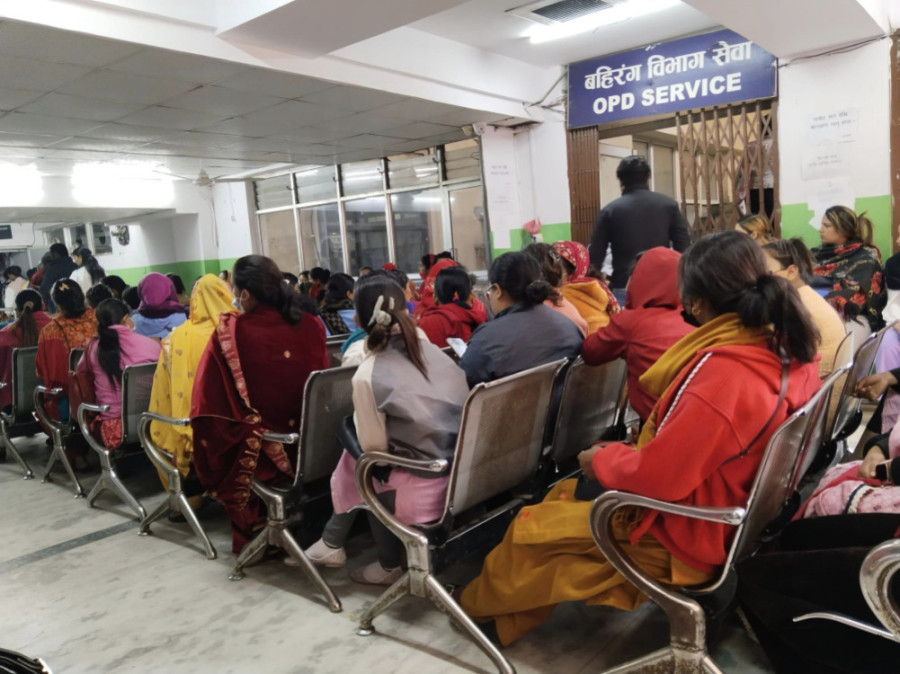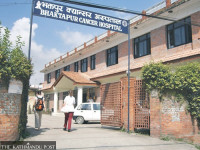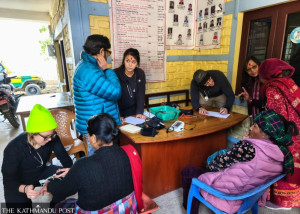Health
Experts doubt implementation of government’s populist decisions
The new government has pledged to end long waiting lists in hospitals, raising health insurance coverage to Rs500,000 and running outpatient care on public holidays. But they are not feasible with existing resources, experts say.
Arjun Poudel
Upon assuming office, Minister for Health and Population Pradip Paudel vowed to end the long waiting lines at public hospitals within a month of his appointment. He then pledged to raise the coverage of the government’s health insurance scheme to Rs500,000 soon.
But neither have the long waiting lines at the state-run health facilities ended, nor have serious discussions been held yet to increase government health insurance coverage.
And now, the Ministry of Health and Population has issued a circular to all agencies concerned to implement the cabinet decision of running outpatient care on public holidays.
Multiple experts the Post talked to, including doctors, retired bureaucrats, and representatives of the Nepal Medical Association, said that it is easier said than done and suggested that Health Minister Paudel should consult with experts before making any decision.
“Many state-run hospitals have not even been able to run extended services,” said Dr Senendra Upreti, the former health secretary. “Decisions to end waiting lists at state-run hospitals, increase coverage of the health insurance scheme and run patient care on public holidays sound too good, but one should also know about the challenges of implementing those decisions. Long waiting lists at the hospitals should have ended as of now if it was so easy to do.”
Most health ministers visit state-run hospitals upon assuming office and direct officials concerned to end the long waiting lists, commit to increasing human resources, and provide a required budget to ease patients’ suffering.
Doctors say people have not expected the repetition of the same commitments from the new minister, from whom they have expected some changes.
“Why would one serve on public holidays without any incentive, and how could the government force only health workers to serve on public holidays, not other civil servants?” questioned Mahendra Prasad Shrestha, a retired chief specialist at the Health Ministry. “I didn’t find other countries providing outpatient care on public holidays.”
Upreti, who also served as chairman of the Health Insurance Board, said the minister's commitment to increase the coverage of the government’s health insurance scheme to Rs500,000 shortly shows his ignorance about the ground reality. The government pays a premium of over 50 percent of those enrolled in the scheme and has to allocate additional billions of rupees to reimburse the hospitals. Due to the government’s inability to reimburse hospitals on time, many hospitals threaten to stop providing the scheme every year.
Public health experts say the government has not increased human resources in state-run hospitals in the last 30 years. Despite that, the number of patients seeking health care has increased manifold, and the capacity and budget of health facilities have not increased accordingly. They said that all staffers are needed to run health facilities on public holidays, and the government has not allocated an additional budget to run health facilities on public holidays.
“I have suggested the new health minister to start from small things,” said Shrestha. “He might have thought that ending long waiting lists in state-run hospitals is trivial, but it is not so trivial. I have also asked him to hold staffers of the Health Ministry until office hours first.”
Meanwhile, the Nepal Medical Association, the umbrella organisation of medical doctors, has protested against the decision to run outpatient departments on public holidays.
Issuing a statement on Tuesday, the association sought the government’s attention to the lack of human resources in the state-run health facilities.
“No new post has been created in the last 33 years,” said Dr Anil Bikram Karki, chairman of the association. “Doctors have already been working 72 hours a week despite not being incentivised to work during the Covid-19 pandemic. We have strong reservations against the decision to run outpatient care on public holidays without offering incentives to health workers and increasing the human resources.”
Doctors say the long waiting lines in state-run health facilities will end if the government creates additional posts for health workers, including doctors, and makes the referral mechanism systematic.
They said patients should not be forced to visit Kathmandu to examine minor health problems. Instead, health workers and services should be made available in the local health facilities, human resources should be increased, and more budget should be allocated.
“If we have problems with long waiting lines in hospitals, citizens have to endure long queues while accessing public service,” said Karki. “Doctors never deny emergency services, but one should not mix emergency care with elective care [planned medical care]. We should acknowledge that doctors are human beings. They, too, have families and will be stressed and burnt out if they are forced to work continuously.”




 10.12°C Kathmandu
10.12°C Kathmandu














